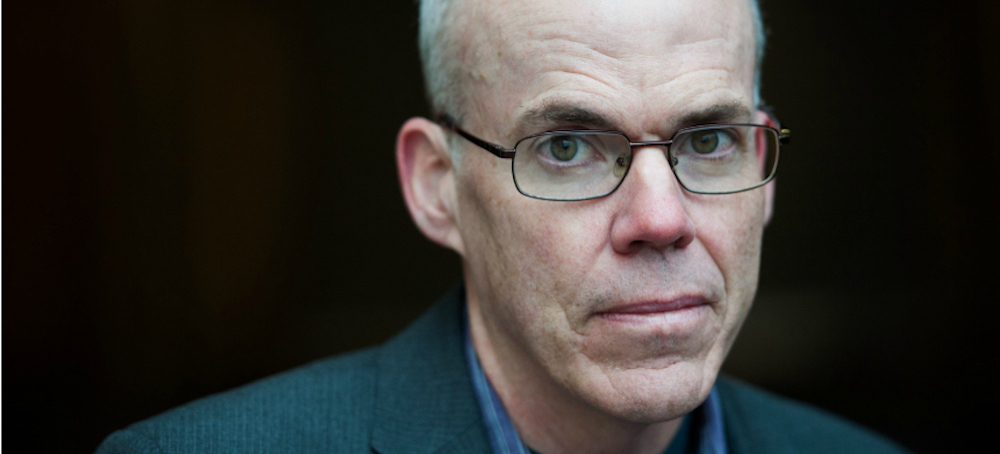Live on the homepage now!
Reader Supported News
Thank climate activists for the fact that any progress was made in Glasgow. Unless we push hard, powerful interests don’t budge
But was this a sea change in the way we deal with the global climate crisis? No –Glasgow moves us down the track a little and boxes in national governments a little more, but it has changed not nearly enough. After 26 iterations, the truth about these Cops is pretty clear: the results are largely determined before they even begin. Yes, there’s an endless succession of concerts, marches, seminars, negotiating sessions, speeches, ultimatums, declarations, photo-ops; and yes, everyone works hard to build a sense of drama (the media especially). But history would suggest that the parties rarely go beyond what they’d intended to do before they arrived.
This is not, I think, a cynical take; rather, it’s always seemed to me that the best way to understand the process of the annual Cops – especially the big ones like Copenhagen or Paris or Glasgow – is to view them as scoreboards rather than contests. They reflect how much of an effect civil society has managed to have over the nations engaged in the negotiations, and the strength of civil society relative to the power of the fossil fuel industry and its friends in the financial community.
Copenhagen failed because there was too little movement building in the years preceding it, allowing a leader like Barack Obama to go home empty-handed and pay no political price. The global climate movement remedied that deficiency before Paris: many governments had no choice but to reach some kind of credible deal and hence a workable framework emerged, albeit without the actual pledges to make it capable of the task. Glasgow was supposed to be the place where countries lived up to the resolutions they’d proudly announced in France, and the decidedly mixed results reflect, at least in part, the difficulties activists have faced over the last few years.
September 2019 may have been the high point to date in climate organising. Millions upon millions of mostly young people took to the streets around the world as the school strike movement opened hearts and minds on every continent. Vanessa Nakate, Xiye Bastida, Greta Thunberg, Luisa Neuberger, Alexandria Villaseñor, Jerome Foster and an almost endless list of very young climate leaders captured imaginations like no one before. Together they formed a wave that seemed as if it would continue cresting. But then came Covid-19 – and it turned out that while it’s possible to do good organising on Zoom, it’s not easy. In any event, the world faced a different crisis for a while, one that understandably took up the most energy. The pandemic illustrated certain useful principles for the climate fight (pay attention to science, flatten curves early). On balance, though, it focused attention elsewhere.
Even before Covid, the landscape for activists had begun to shrink. The rise of illiberal governments around the world – Trump’s America, but also Xi’s China (more restrictive even than its predecessors were on civil society), Bolsonaro’s Brazil, Erdoğan’s Turkey, Putin’s Russia. Much of the world is largely off limits to activism, especially the global kind exemplified by the climate movement. (The leader of the youth climate movement in India, for instance, spent several weeks behind bars; now she’s awaiting trial, and the police wouldn’t permit her travel to Glasgow.)
Most of the world’s biggest countries are now beyond the reach of protest, and to a large degree unresponsive even to international pressure. China issued a joint statement with the US vaguely pledging future action, but it also made clear that it didn’t look forward to the annual revisions of its climate targets that activists – and scientists – have demanded. And no one really has an idea how to counter this, any more than they know how to counter the fact that American polling finds Republican voters even more resistant to the reality of climate change than they were a few years ago. Since there’s a very good chance that Republicans will control Congress by the time of next year’s Cop in Egypt, it’s hard to see what leverage there will be to move the process forward.
But still. As vaccines spread, activism is spreading again too: the marches in Glasgow were as spirited as any I have ever seen, and Thunberg – with her superb gift for saying and doing the right thing at the right time – helped everyone understand the meaning of Glasgow with her “blah, blah, blah” framing. Yes, the other side is also better at its game: greenwashing has become steadily more complex, and taking apart claims like “net zero by 2050” has become a full-time occupation. But since these are lies, they will look steadily more shabby, exposed by each flood and hurricane.
My guess is that movements will adapt to the blockages in the Cop process, and powerfully. I think there’s going to be ever more attention on the financial industry, in part because it’s crucial to the fossil fuel machine, in part because it’s located in places like New York and London, where protest of all kinds can still be carried out. And as Covid recedes, that rejuvenated activism will combine with the continuing horror of the climate crisis to produce more pressure for change. It had better – Glasgow’s finish makes clear that when activists aren’t able to push as hard as we need, inertia and vested interest remain powerful forces. The idea that the world’s governments will simply do what needs to be done is just a fairytale.
In that sense, the Cop tells us not just what we’ve done in the past few years, but what we have to do in the ones ahead. The planet is out of its comfort zone; we had best be even further out of ours.
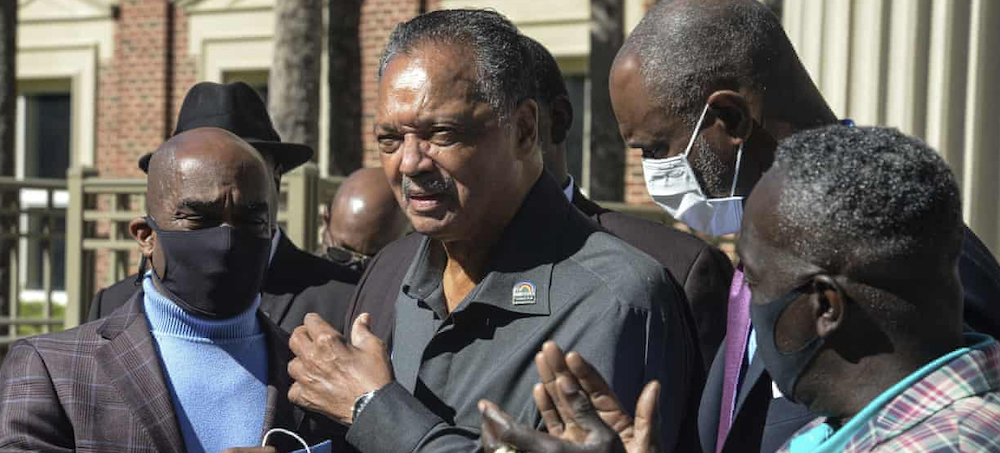 The Reverend Jesse Jackson enters the Glynn county courthouse in Brunswick, Georgia, on Monday for the trial of three men accused of murdering Ahmaud Arbery. (photo: Terry Dickson/AP)
The Reverend Jesse Jackson enters the Glynn county courthouse in Brunswick, Georgia, on Monday for the trial of three men accused of murdering Ahmaud Arbery. (photo: Terry Dickson/AP)
Defense claimed jurors were tainted by tears in gallery, where the reverend joined Arbery’s parents
Monday morning’s testimony was interrupted by arguments in the jury’s absence over Jackson’s appearance. The judge said he found one defense lawyer’s complaints last week about Black pastors to be “reprehensible” and no group would be excluded from his courtroom.
Greg and Travis McMichael, a father and son, armed themselves and pursued the Black 25-year-old in a pickup truck after spotting him running in their neighborhood on 23 February 2020. Their neighbor William “Roddie” Bryan joined the chase and took cellphone video of Travis McMichael shooting Arbery three times with a shotgun.
Tensions flared in the courtroom on Monday morning soon after Jackson sat in the back row of the courtroom between Arbery’s parents. The defense attorney Kevin Gough asked the judge to make the civil rights leader leave to avoid unfairly influencing the jury.
Gough, an attorney for Bryan, also complained last week when the Rev Al Sharpton joined Arbery’s mother, Wanda Cooper-Jones, and father, Marcus Arbery Sr, inside the Glynn county courtroom. Gough told the judge on Thursday: “We don’t want any more Black pastors coming in here.”
“There is no reason for these prominent icons in the civil rights movement to be here,” Gough said Monday. “With all due respect, I would suggest, whether intended or not, that inevitably a juror is going to be influenced by their presence in the courtroom.”
The superior court judge, Timothy Walmsley, declined the request. Courtrooms are generally open to the public, although the judge has limited seating in the public gallery because of the coronavirus pandemic.
“The court is not going to single out any particular individual or group of individuals as not being allowed into his courtroom as a member of the public,” Walmsley said. “If there is a disruption, you’re welcome to call that to my attention.”
Jackson told reporters outside the courthouse that he had come to coastal Brunswick to support justice for Arbery’s family, not in response to the attorney’s previous remarks about Black pastors.
“As the judge said, it was my constitutional right to be there,” Jackson said. “It’s my moral obligation to be there.”
During the actual trial, an agent from the Georgia bureau of investigation, Jason Seacrist, returned to the witness stand. Gough pressed Seacrist about claims that Arbery tried to get into Bryan’s truck during the chase. Investigators testified that they had found Arbery’s fingerprints on the truck near one of the door handles.
“Is it fair to say the first identifiable crime Mr Bryan personally witnessed that day would be Mr Arbery trying to get in his truck?” Gough asked.
Seacrist replied: “Unless you discount the fact that somebody was trying to chase Mr Arbery down while he was legally running, jogging in the road.”
Bryan and the McMichaels are charged with murder and other crimes. Prosecutors say they chased Arbery for five minutes to keep him from leaving the Satilla Shores subdivision outside the port city of Brunswick.
The chase ended when Arbery, trailed by Bryan’s truck, tried to run around the McMichaels’ truck as it idled. The video shows Travis McMichael confronting Arbery and shooting him as he throws punches and grapples for the gun.
The McMichaels told police they suspected Arbery was a burglar after security cameras several times recorded him inside the unfinished house five doors from their own house. Defense attorneys say Travis McMichael opened fire in self-defense.
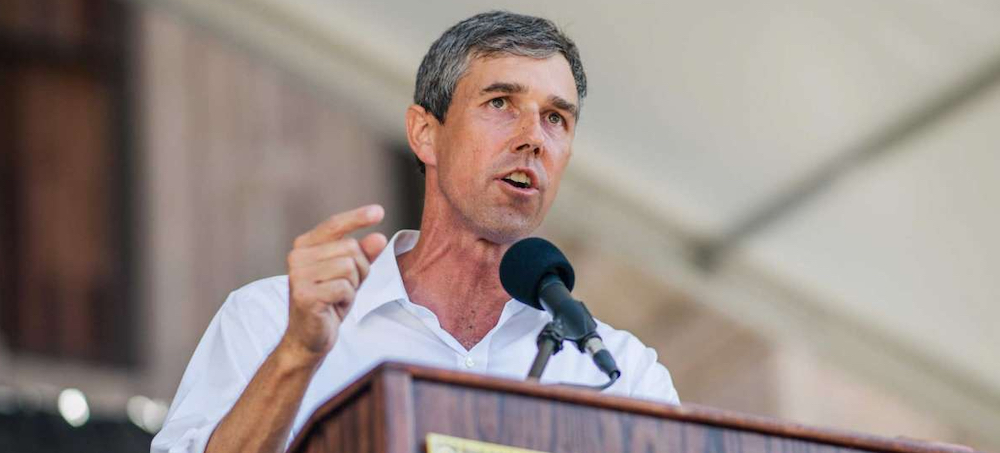 Former U.S. Rep. Beto O'Rourke speaks during the Georgetown to Austin March for Democracy rally on July 31, 2021, in Austin, Texas. (photo: Brandon Bell/Getty Images)
Former U.S. Rep. Beto O'Rourke speaks during the Georgetown to Austin March for Democracy rally on July 31, 2021, in Austin, Texas. (photo: Brandon Bell/Getty Images)
In 2018, O’Rourke, a three-term House member from El Paso, became a national political celebrity by exploiting coast-to-coast Democratic hostility toward Republican senator Ted Cruz, eventually posting record fundraising numbers and throwing a scare into the former presidential candidate, losing by less than three points. (Cruz had won by 15 points in his first general election in 2012.) Even as many Democrats urged him to run against Cruz’s GOP sidekick (and Mitch McConnell crony) John Cornyn in 2020, O’Rourke decided to go long with his fame, running for president instead. For a hot minute, he looked like someone who might thread the needle in a big Democratic field, balancing personality-based appeal to young and Latino voters with promotion of a generally moderate platform with some edge. But he faded as he failed to strike much of a chord in the early states and then got outperformed by Pete Buttigieg in the “lane” assigned to charismatic young moderates. In the ultimate twist of fate, the 2018 fundraising champ dropped out of the presidential race on November 1, 2019, because he ran out of money.
So now O’Rourke is returning to what might have been Plan A for his political career with a second statewide run in Texas. Most Texas Democrats seem to be onboard with his candidacy, and at this point the only cloud on the horizon in terms of the Democratic gubernatorial nomination is the possibility of a primary challenge from actor Matthew McConaughey, who has managed to create and sustain speculation that he will run for governor as a Democrat, an independent, or even a Republican. Despite all the buzz over McConaughey, it’s likely his appeal will fade once he does declare a party preference, and today’s polarized environment is not great for indies.
The McConaughey question aside, O’Rourke is hoping that despite Greg Abbott’s incumbency and the GOP’s continuing advantage in Texas (which may be strengthened temporarily by the national midterm swing against Democrats as the White House party), the incumbent may be vulnerable due to his missteps in dealing with the state’s energy grid during winter storms and the tack to the right (including extremism on masks and COVID-19 vaccines) he has undertaken to head off a serious GOP primary challenge. Indeed, some observers think Abbott is overlooking a 2022 general-election challenge and planning a future presidential run, which dictates lots of MAGA posturing. And Democrats may be easy to energize in 2022 thanks to the extreme laws Texas Republicans have passed in 2021 restricting voting rights and all but outlawing abortion.
But O’Rourke has his own problems owing to presidential politics. Not long before his 2020 campaign petered out, he tried to regain attention and relevancy by taking left-bent positions on hot-button cultural issues, endorsing a mandatory buyback program for assault weapons and suggesting a revocation of tax-exempt status for churches that oppose same-sex marriage. Messing with guns and conservative Christianity is not exactly a prescription for political success in Texas, and Republicans will be sure to remind voters of O’Rourke’s heresy on these issues early and often.
Still, polls show Abbott potentially vulnerable and O’Rourke at least competitive. Polls from both the Dallas Morning News and the University of Texas/Texas Tribune show O’Rourke within single digits of Abbott, and a November 1 survey from Rice University had Abbott’s lead down to a single point. The same Rice poll also showed McConaughey as an indie pulling only 9 percent against O’Rourke and Abbott.
But there is a recent history of Texas Democrats underperforming early polls when voters actually vote. In the long run, the Donkey Party will have a demographic opening in Texas, much as it has demonstrated in previously red states like Arizona and Georgia, so long as Democrats can figure out how to reverse the pro-Republican trend among Hispanic voters that was so evident there in 2020 (which is far from being a given). But it’s unclear a midterm election taking place under newly restrictive rules as a Democrat struggles in the White House will present an opportunity for the long-awaited Democratic breakthrough.
If O’Rourke does lose again, it could be a lethal blow to the once-promising career of the politician who is still south of his 50s. Presumably he’d rather take the risk of becoming a three-time loser than the answer to political trivia questions about what “Betomania” once meant.
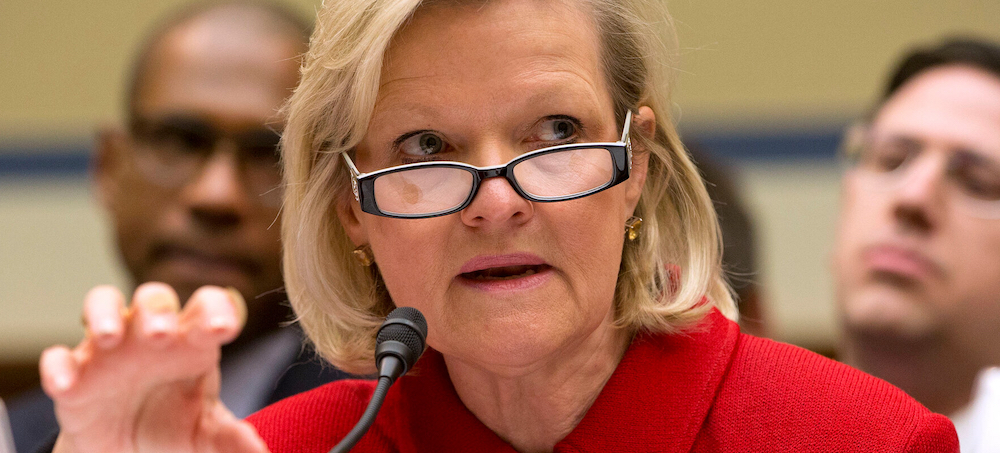 Attorney Cleta Mitchell was on the infamous January conference call between Trump and Georgia Secretary of State Brad Raffensperger. (photo: Pablo Martinez Monsivais/AP)
Attorney Cleta Mitchell was on the infamous January conference call between Trump and Georgia Secretary of State Brad Raffensperger. (photo: Pablo Martinez Monsivais/AP)
 Vietnamese policemen stand guard outside a courtroom in Hanoi, Vietnam. (photo: Reuters)
Vietnamese policemen stand guard outside a courtroom in Hanoi, Vietnam. (photo: Reuters)
Nguyen Tri Gioan, 42, was convicted of "making, storing, spreading information, materials, items for the purpose of opposing the state" at a one-day trial in the central province of Khanh Hoa, the official Vietnam News Agency said.
Despite sweeping economic reform and increasing openness to social change, Vietnam's ruling Communist Party retains tight media censorship and tolerates little criticism.
Gioan was accused of posting poems and images on his Facebook accounts to "distort, slander and defame the leadership of the (Vietnam Communist) party, the state and leader Ho Chi Minh," the report cited the indictment as saying.
Reuters could not immediately reach his lawyer for comment. There was no immediate response from Facebook.
The report said Gioan pleaded guilty at the trial. Once the jail term is over, he will be placed under house arrest for three years, it said.
 A missile at a demonstration show in Russia. (photo: Getty Images)
A missile at a demonstration show in Russia. (photo: Getty Images)
The test marked the first time that Russia has demonstrated an ability to strike a satellite using a missile launched from Earth.
During a briefing, State Department spokesman Ned Price said the anti-satellite test created more than 1,500 pieces of sizable debris that could damage other satellites or affect astronauts at the International Space Station.
“Earlier today, the Russian Federation recklessly conducted a destructive … test of a direct ascent anti-satellite missile against one of its own satellites,” Price said. “The test has so far generated over 1,500 pieces of trackable orbital debris and hundreds of thousands of pieces of smaller orbital debris that now threaten the interests of all nations.”
Price said the test threatens astronauts on the space station and “clearly demonstrates that Russia’s claims of opposing the weaponization of space are disingenuous.”
Russia’s Ministry of Defense confirmed in a statement that it “successfully conducted a test, as a result of which the inactive Russian spacecraft Tselina-D, which has been in orbit since 1982, was hit.”
But the ministry said the test “did not and will not post a threat to orbital stations, spacecraft and space activities.”
Foreign Minister Sergei Lavrov said Tuesday that the U.S. claim “that Russia poses risks to activities for the peaceful use of outer space is, to say the least, hypocrisy.”
He said it’s the Americans who have ignored proposals from Russia and China on arms regulation in space.
In an interview with The Washington Post, NASA Administrator Bill Nelson called the strike “outrageous” and “unconscionable.”
“It’s inexplicable that they would do this and threaten not only our astronauts after we’ve cooperated in space since 1975, but threaten their own cosmonauts,” he said.
He noted that NASA astronaut Mark Vande Hei, who flew to the station as part of the Russian crew, evacuated the station with the Russian cosmonauts and sought shelter with them in the Russian Soyuz attached to the station.
Nelson said that the debris could do “serious damage” to the station and that he was “quite concerned” about the safety of the astronauts.
He said he would not be surprised if his counterpart at the Russian space agency, Dmitry Rogozin, didn’t “know a thing about this, and it’s the Russian military doing their thing.” There is currently a NASA delegation in Russia, and he said he believes that members of the Russian space agency “didn’t know anything about this. And they’re probably just as appalled as we are.”
The NASA delegation in Russia will seek to discuss the missile test on Wednesday in Moscow, the RIA state news agency cited NASA’s head as saying.
The United States has accused Russia of testing space weapons before. In July 2020, U.S. Space Command said the country had conducted a “nondestructive test of a space-based anti-satellite weapon,” accusing Moscow of injecting a “new object into orbit” from one of its known military satellites.
Brian Weeden, director of program planning at the Secure World Foundation, said Moscow has conducted other types of anti-satellite tests in the past that have involved one satellite attacking another.
In recent years, Russia has been doing close maneuvers with other satellites and at one point appeared to launch a projectile from one of its satellites, but those incidents did not involve a strike creating debris, he said.
The previous activity occurred within a Russian satellite system that U.S. officials had raised concerns about in the past, after it maneuvered near a U.S. government satellite in a move that Washington saw as evidence that Moscow was trying to advance its space weaponry.
“Historically, Russia has been interested in developing anti-satellite weapons to be able to take out American space capabilities in the event of a conflict and also to be able to take out potential space-based missile defenses which could threaten the Russian nuclear deterrent,” Weeden said.
Rep. Mike D. Rogers (R-Ala.), who serves on the House Armed Services Committee, said the test showed why the U.S. Space Command and Space Force are needed.
“Space has already become a warfighting domain,” he said.
LeoLabs, a U.S. company that tracks space debris, confirmed on Twitter that it was seeing debris near the expected location of Cosmos 1408, which NASA describes as an abandoned electronic and signals intelligence satellite launched by the Soviet Union in 1982.
China conducted an anti-satellite weapons test using a projectile launched from Earth in 2007. The following year, the United States struck one of its own spy satellites that was malfunctioning and expected to crash to Earth. India conducted a kinetic anti-satellite test in 2019.
Pentagon spokesman John Kirby said the U.S. government was closely tracking Russian space capabilities.
“We’re concerned about any nation that would weaponize space,” he said. “We want to see the space domain subject to international norms and rules so that it can be explored by all space-faring nations in a responsible way, and this was an irresponsible act.”
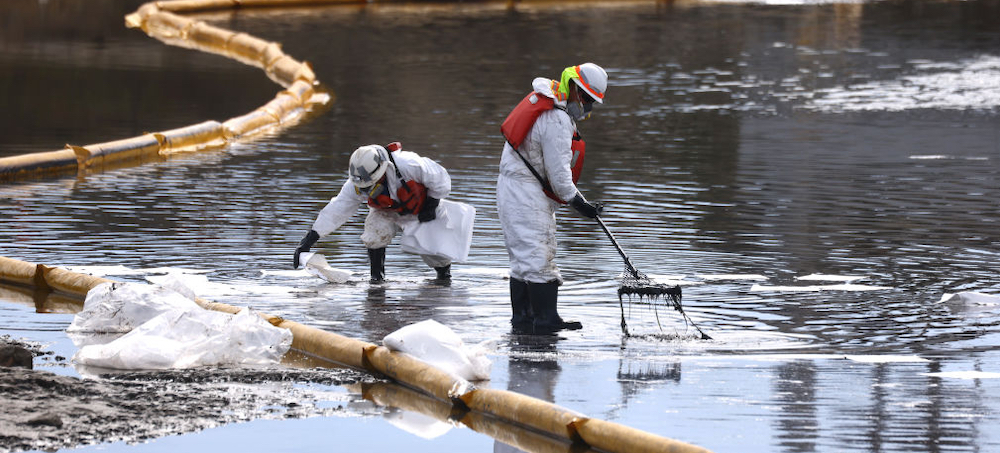 Clean up after a 126,000-gallon oil spill from an offshore oil platform in Huntington Beach, California, October 4, 2021. (photo: Mario Tama/Getty Images)
Clean up after a 126,000-gallon oil spill from an offshore oil platform in Huntington Beach, California, October 4, 2021. (photo: Mario Tama/Getty Images)
Workers’ retirement savings are being used to bankroll oil and gas companies’ climate destruction.
Complicating matters is that Amplify, the product of a merger and vulture capital restructuring of another bankrupt oil company, may not have enough cash to pay for cleanup or decommission the pipeline. That means taxpayers could end up bearing the costs.
This ecological and financial nightmare was in part funded by the retirement savings of school teachers in Pennsylvania.
That’s because the largest shareholder in Amplify is a hedge fund called Avenue Capital Group. The hedge fund is led by Milwaukee Bucks owner Marc Lasry, the short-lived chair of the scandal-plagued media company Ozy and the father of Wisconsin Democratic Senate candidate Alex Lasry. In 2019, Avenue purchased a nearly 7 percent ownership stake in Amplify, making it the largest shareholder and giving the firm a seat on Amplify’s board.
Avenue financed the purchase with money from public employees’ retirement funds — spotlighting how millions of workers’ savings are now being used to prop up the fossil fuel industry amid the climate crisis.
In 2017, staff members of Pennsylvania’s scandal-plagued public school teachers pension, PSERS, committed $100 million to an Avenue fund that buys distressed fossil fuel assets, “Avenue Energy Opportunities Fund II” — the same fund that invested in Amplify. It was seen as a high-yield investment by pension fund staff, who explained in a report: “Several factors have created a compelling opportunity for investing in North American energy and utility companies in financial stress or distress.”
PSERS did not respond to a request for comment.
Pennsylvania teachers weren’t the only ones to invest public workers’ retirement savings in the fund. The Santa Barbara County Employees’ Retirement System in California committed $15 million, while the Minnesota State Board of Investment committed $100 million, the Illinois State Board of Investment committed $100 million, and the Teacher Retirement System of Texas committed $150 million.
“Private Equity Is Standing in the Shadows”
As pension fund investments in private equity have grown over the past decade, cases like this one — where workers’ retirement savings go into funds that are buying up fossil fuel assets and squeezing them for profit in their final breaths — are increasingly common.
While Avenue’s investment in fossil fuel assets is public knowledge, that isn’t always true, since private equity firms are subject to few disclosure requirements that would shed light on their fossil fuel investments.
Private equity firms have scooped up $1.1 trillion in fossil fuel assets since 2010, according to a recent report by the Private Equity Stakeholder Project, propping up the industry even as the divestment movement has pressured public companies and lenders to stop financing coal, oil, and gas.
“Private equity is standing in the shadows, buying up assets that those other entities are trying to shed,” Alyssa Giachino, author of the report, told the Daily Poster.
These financial moves are being increasingly funded by US workers, since public pension funds have become the most important investors for private equity firms. In the United States, public pension funds manage $4 trillion worth of capital — about 20 percent of the country’s annual GDP — and in 2020, these funds had an average of 9 percent of their capital invested in private equity.
This arrangement poses a huge risk to workers and their retirement savings. Fossil fuel assets are increasingly volatile, as political pressure encourages investors to shed them and governments commit to cutting emissions. Furthermore, climate change poses an existential risk — including to the workers who may be inadvertently funding the fossil fuel industry’s ongoing destruction.
“While the world urgently needs to decarbonize, labor’s retirement capital is still propping up private equity’s fossil fuel industry at the expense of severe ecological devastation and marginalized communities who will be disproportionately impacted,” said Riddhi Mehta-Neugebauer, research director for the University of Washington’s Harry Bridges Center for Labor Studies.
Divestment’s Unintended Consequences
The most effective tool that governments have to limit carbon emissions is to make it more difficult to finance fossil fuel development, and instead fund green energy projects. And while it’s happening much too slowly, the investors, regulators, and climate activists behind the divestment movement are starting to notch major victories.
These efforts have been successful in making it more expensive for fossil fuel companies to finance new drilling operations or infrastructure. One fossil fuel industry trade group recently told federal regulators that the divestment movement’s victories have “negatively affected the industry’s access to capital over the last few years.”
However, those wins are also driving investments to private equity firms, which aren’t required to publish standardized disclosure reports.
One of the reasons that pension managers aren’t doing much to stop their funds from inadvertently funding fossil fuel interests is because many of them are delegating their management duties to those who have a stake in private equity.
“A lot of these pension fund trustees are teachers, government sector workers, or firefighters,” explained Mehta-Neugebauer. “There’s a big learning curve to go from being a government worker or schoolteacher to go into an investment space and suddenly be expected to understand private equity returns. So they tend to defer to the industry experts.”
These private equity interests have undertaken massive campaigns to sell their products to pension funds, touting high returns that looked appealing after the Great Recession left pension funds struggling to make up shortfalls.
“If you just look at the returns, you might miss the fact that your fund is invested in a pipeline or export terminal that’s causing all sorts of community harm and environmental harm,” Mehta-Neugebauer added.
Such private equity funds are also structured in a way that exposes pensioners to disproportionate risk. Private equity is already highly leveraged, meaning that when a firm purchases an asset it is doing so with a large amount of debt, rather than a lot of equity. Much of the equity that is put forward comes from institutional investors, such as pension funds, rather than from the firms themselves.
So if these fossil fuel assets end up losing money, the losses hit the investors with the biggest equity stakes, which in many cases are pensions.
It is also often challenging for pension funds to divest from private equity once they invest in the sector, because they commit their capital to the firms on fixed time scales, usually of at least a few years.
The Power of Pensions
But if pension funds are increasingly tied to oil, gas, and coal through private equity investments, that means these funds also have a chance to shape these fossil fuel investments.
“Pension funds are uniquely positioned to influence the private equity industry, because they are a substantial source of capital,” said Giachino.
Pension fund managers are supposed to make investment decisions based on their fiduciary duty to maximize returns and minimize risks. Increasingly, pension funds are recognizing that fulfilling this duty involves divesting from fossil fuels, both because those assets are underperforming and because fiduciaries recognize that climate change will harm the workers invested in the funds. Pension funds in Maine, New York City, New York state, and Rhode Island, as well as Quebec and the Netherlands, have begun divesting from fossil fuels in the past few years.
While fossil fuel interests and corporate politicians claim fossil fuel divestment will hurt workers’ savings, such assertions have been repeatedly disproven. A report by BlackRock surveying institutions that had divested from fossil fuels, including ten public pension funds, found: “Of investors measuring the impact of fossil fuel divestment (4 of 13 respondents), no investors found negative performance from divestment; rather, [they saw] neutral to slightly positive results.”
According to a recent report by Mehta-Neugebauer, pension funds should also be requiring the private equity funds where they are invested to disclose their fossil fuel assets.
“Labor’s retirement capital has failed to adequately hold their private equity managers accountable for the damage they have already caused the planet, and they continue to enable the industry’s greenwashing by refusing to publicly disclose all portfolio company-level indirect and direct emissions, comprehensive energy transition plans, and executive lobbying,” Mehta-Neugebauer told the Daily Poster.
Such disclosures could be useful, since private equity firms are increasingly “rebranding [themselves] as the next big thing in green and socially minded money management,” according to a recent story by Bloomberg Businessweek. Requiring private equity firms to disclose their fossil fuel investments could help combat such greenwashing.
Gary Gensler, President Joe Biden’s chair of the Securities and Exchange Commission, the federal agency that regulates public and private companies, has also signaled that the agency will move to require more disclosure from private equity.
“Every pension fund investing in private funds would benefit if there were greater transparency and competition,” he told the Financial Times in October.
In the meantime, some pension managers are already taking steps to require such disclosures. Brad Lander, the newly elected comptroller of New York City, has suggested that he won’t follow in the footsteps of his predecessor Scott Stringer, who massively increased private equity investments while simultaneously divesting from fossil fuel stocks. Instead, Lander has pledged to also pursue divestment from the fossil fuel investments of private equity and hedge funds.
Follow us on facebook and twitter!
PO Box 2043 / Citrus Heights, CA 95611

